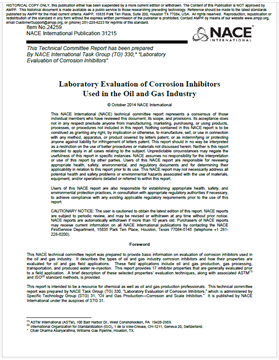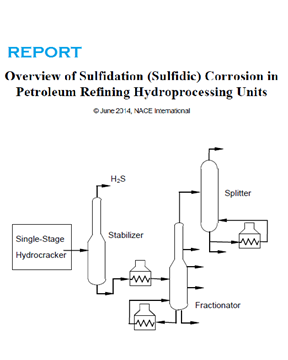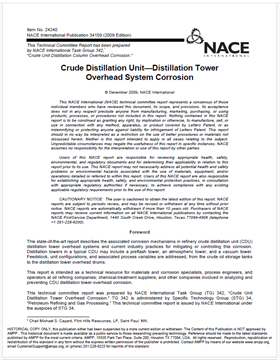Search
Products tagged with 'Standards and Reports'
View as
Sort by
Display
per page
NACE PUBLICATION 21414-SG (2016 Edition), “Maintenance Overcoating of Railcar Exteriors”
Product Number:
21414-SG
ISBN:
1-57590-363-6
Publication Date:
2016
$109.00
NACE Publication 30105-2005-SG, Electrical Isolation/Continuity and Coating Issues for Offshore Pipeline Cathodic Protection Systems
Product Number:
24228-SG
ISBN:
NACE Pub 30105
$109.00
NACE Publication 31105-2005-SG, Dynamic Scale Inhibitor Evaluation Apparatus and Procedures in Oil and Gas Production
Product Number:
24225-SG
ISBN:
NACE Pub 31105
Publication Date:
2005
$109.00
NACE Publication 31205-2006-SG, Selection, Application, and Evaluation of Biocides in the Oil and Gas Industry
Product Number:
24227-SG
ISBN:
NACE Pub 31205
$109.00
NACE Publication 31215-2014, “Laboratory Evaluation of Corrosion Inhibitors Used in the Oil and Gas Industry
Product Number:
24259-SG
Publication Date:
2014
$179.00
NACE Publication 34103-2014-SG, Overview of Sulfidation (Sulfidic) Corrosion in Petroleum Refining Hydroprocessing Units
Product Number:
24222-SG
Publication Date:
2014
$109.00
NACE Publication 34105-2005-SG, Effect of Nonextractable Chlorides on Refinery Corrosion and Fouling
Product Number:
24226-SG
ISBN:
NACE Pub 34105
$109.00
NACE Publication 34108-SG, Review and Survey of Alkaline Carbonate Stress Corrosion Cracking in Refinery Sour Waters
Product Number:
24236-SG
Publication Date:
2008
$109.00
NACE Publication 34109-2009, Crude Distillation Unit—Distillation Tower Overhead System Corrosion
Product Number:
24240-SG
Publication Date:
2009
$179.00
NACE Publication 35101-2001-SG, Plastic Liners for Oilfield Pipelines
Product Number:
24212-SG
ISBN:
35101Plastic Li
$109.00
NACE Publication 35103-2003-SG, External Stress Corrosion Cracking of Underground Pipelines
Product Number:
24221-SG
ISBN:
35103
$109.00












